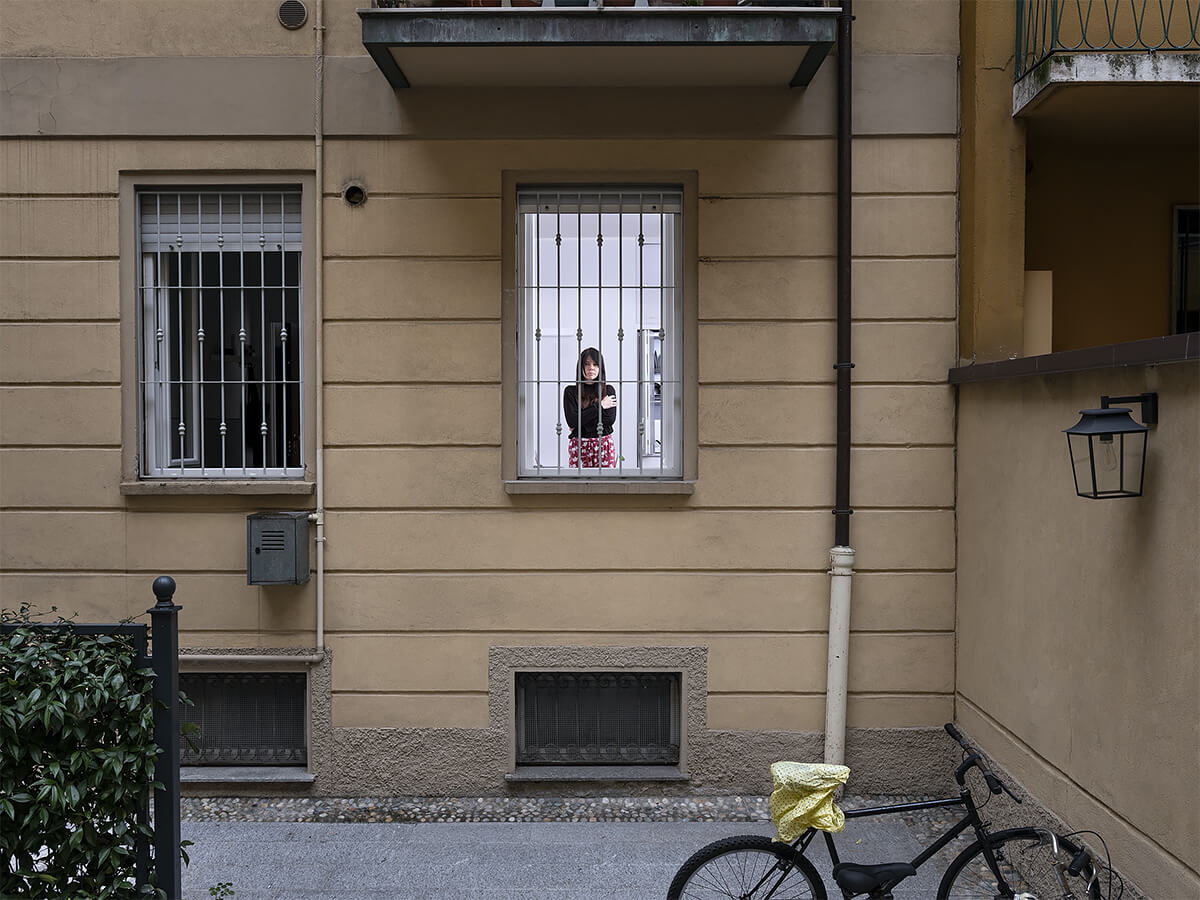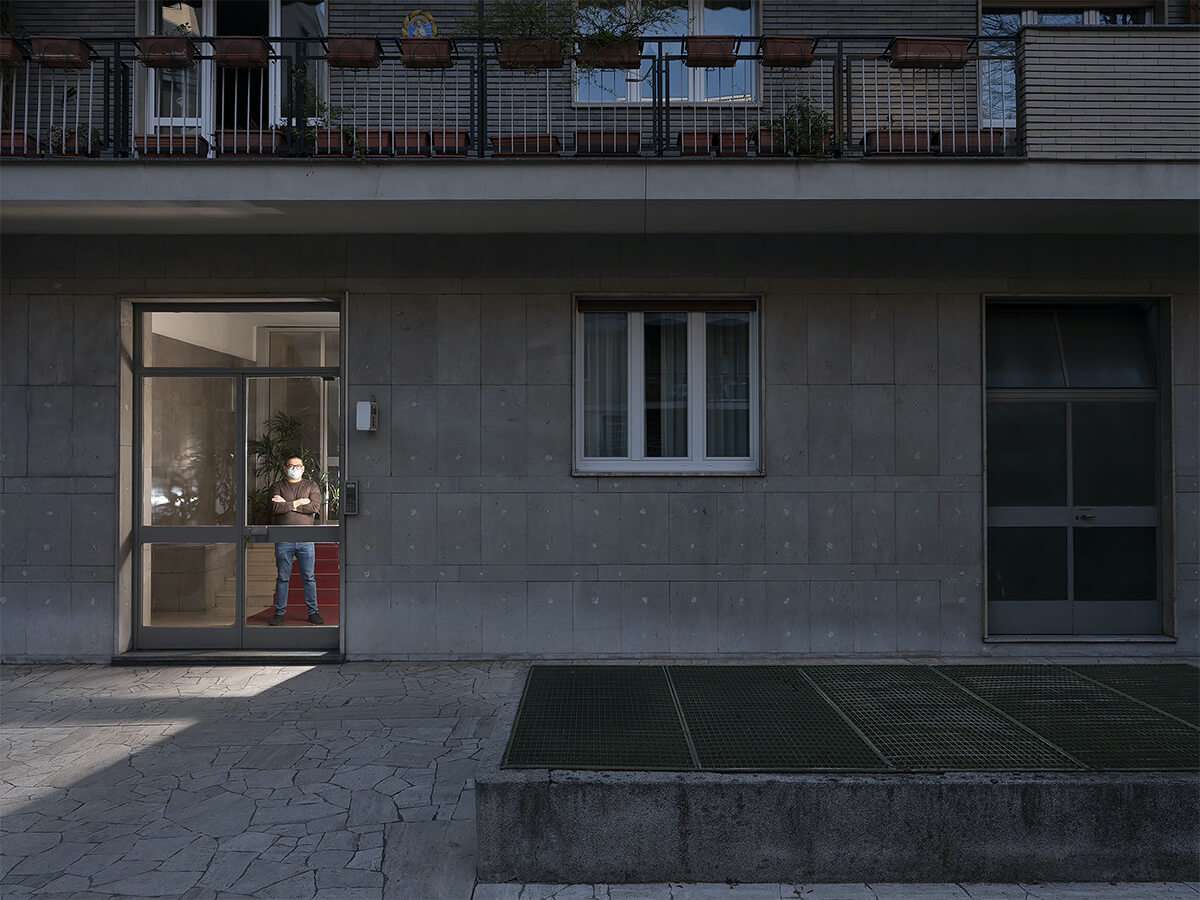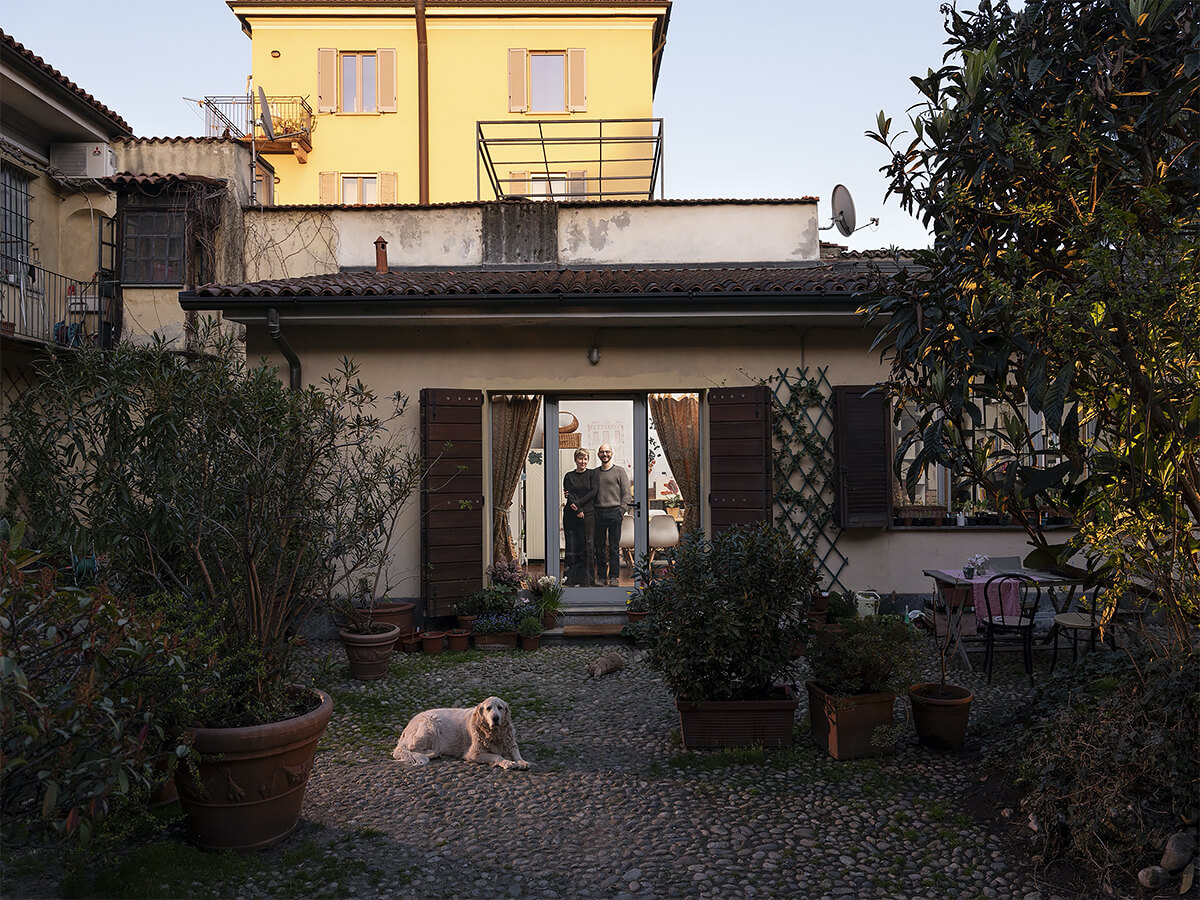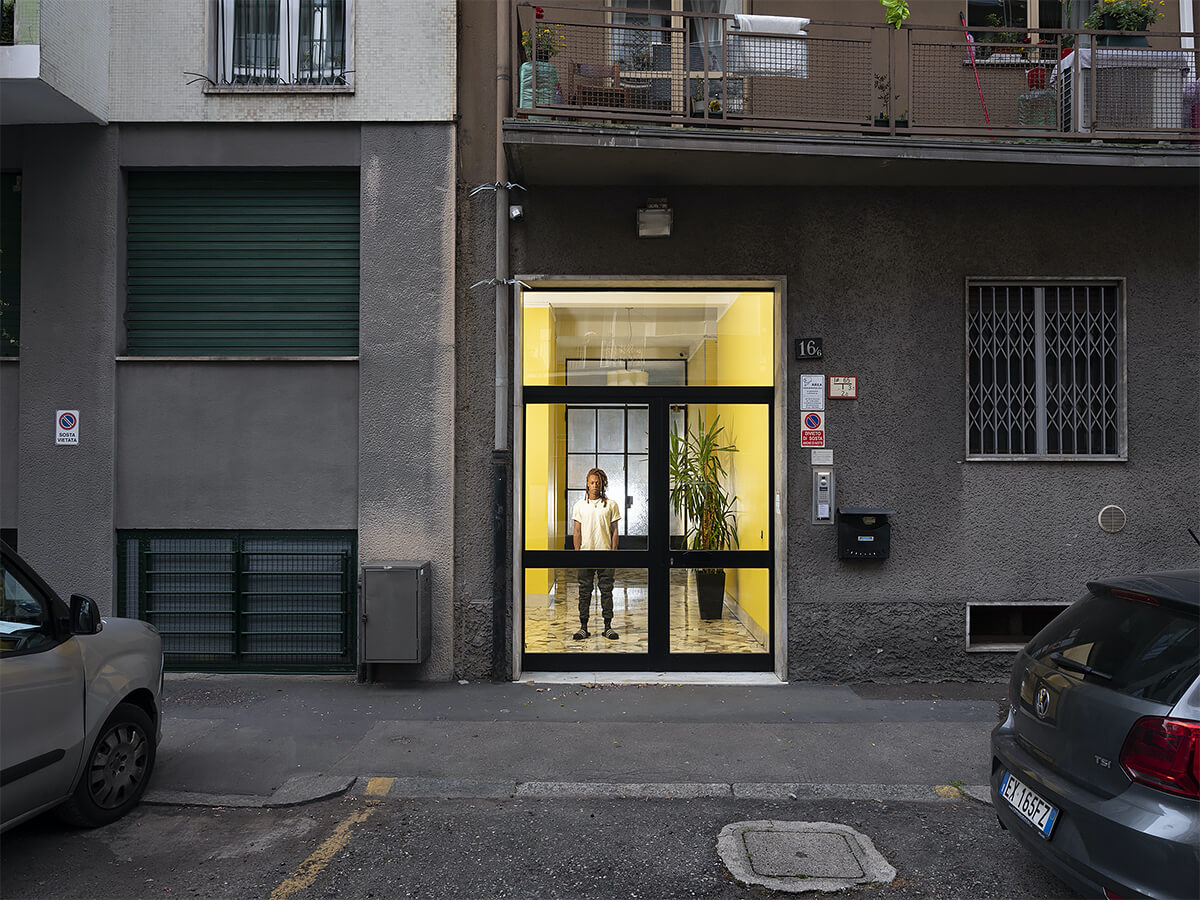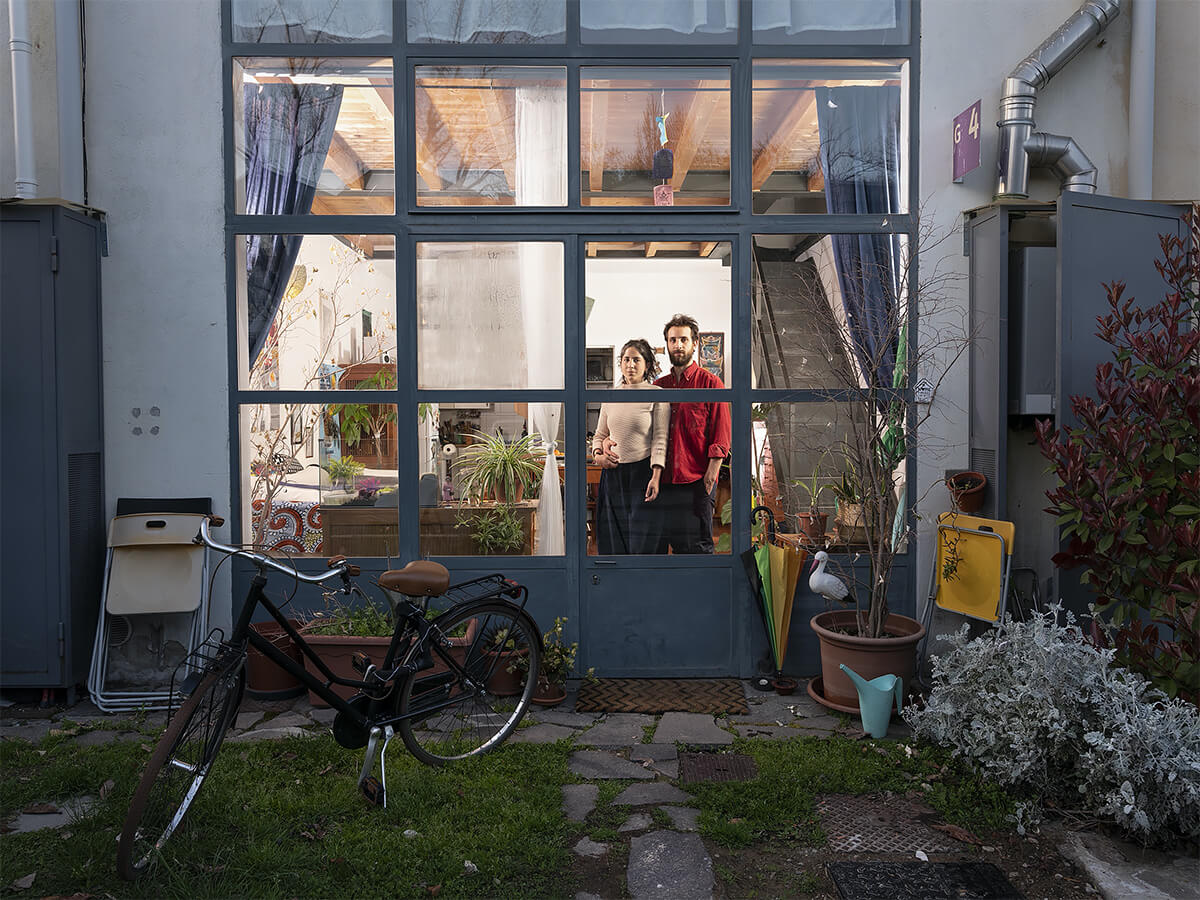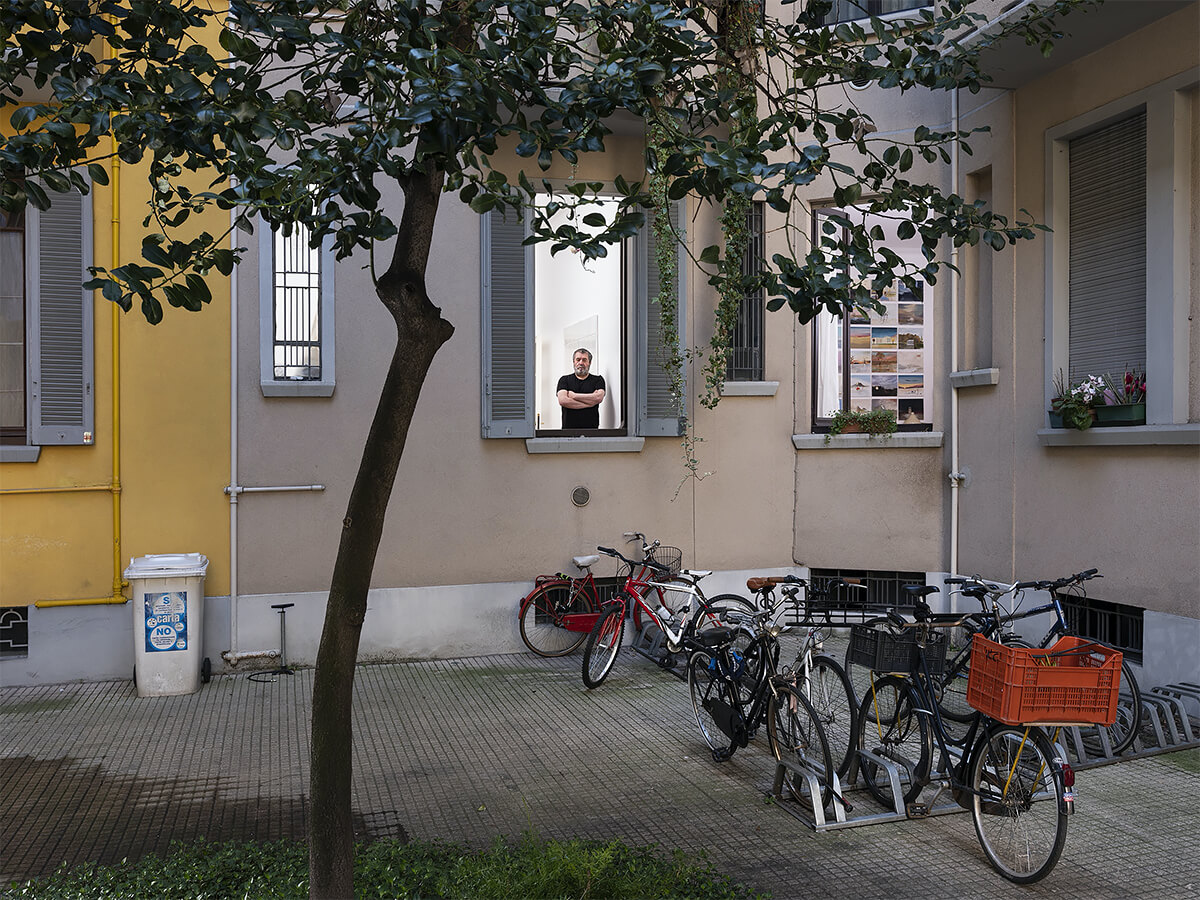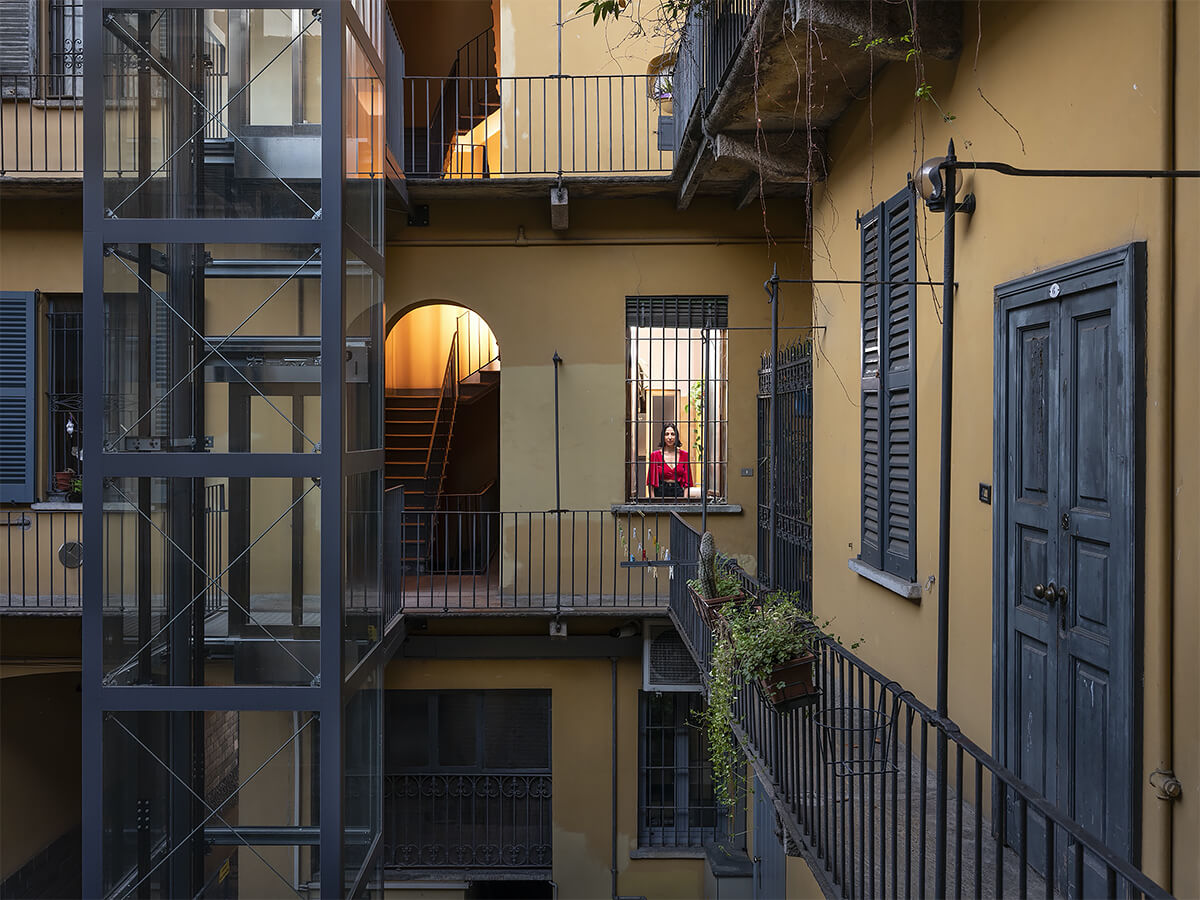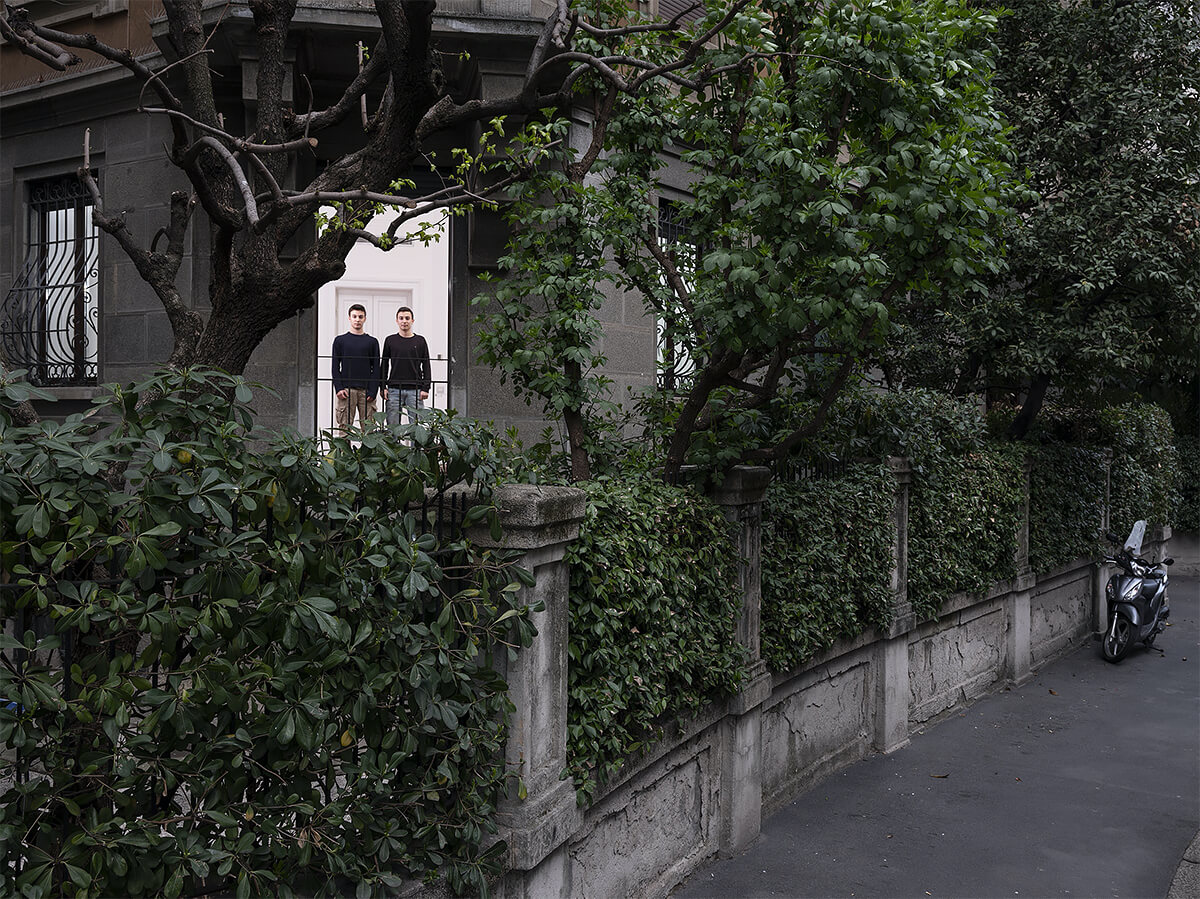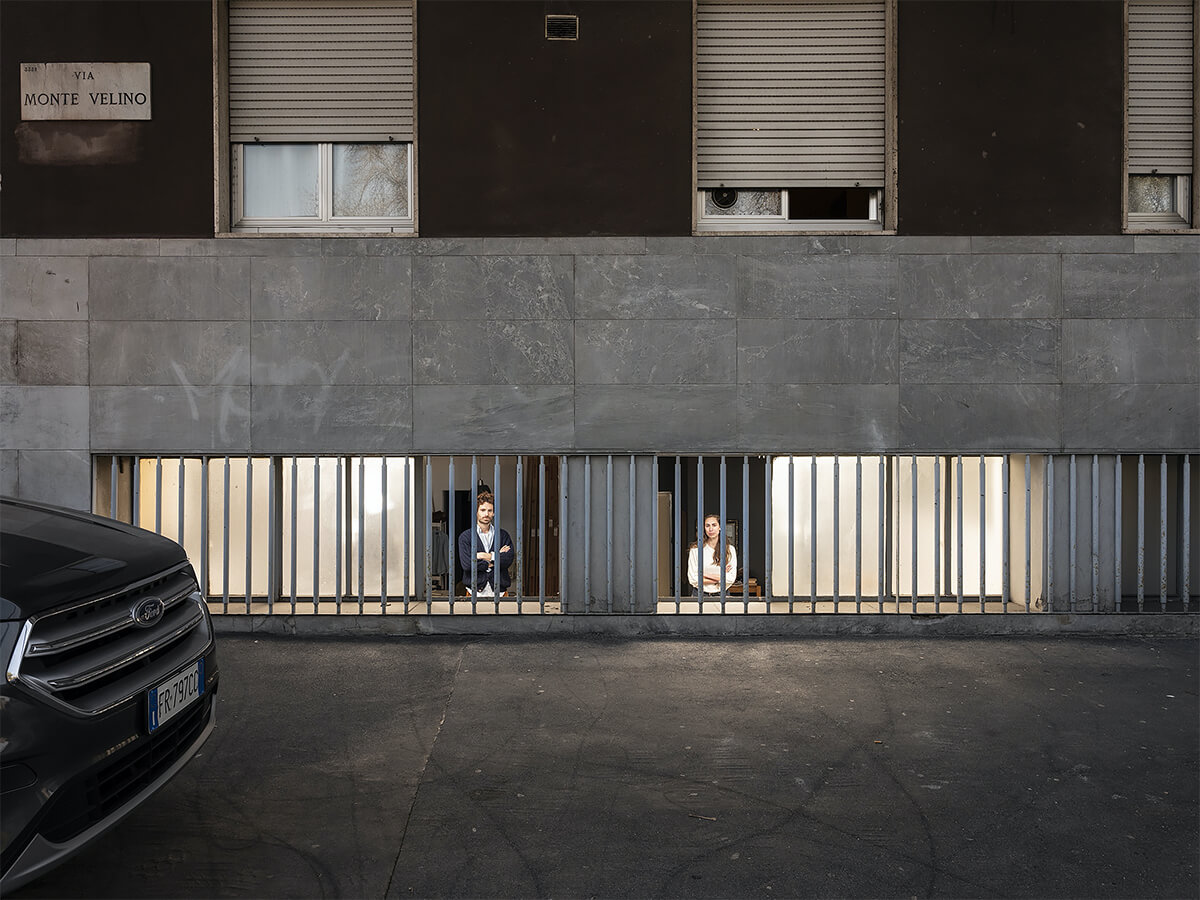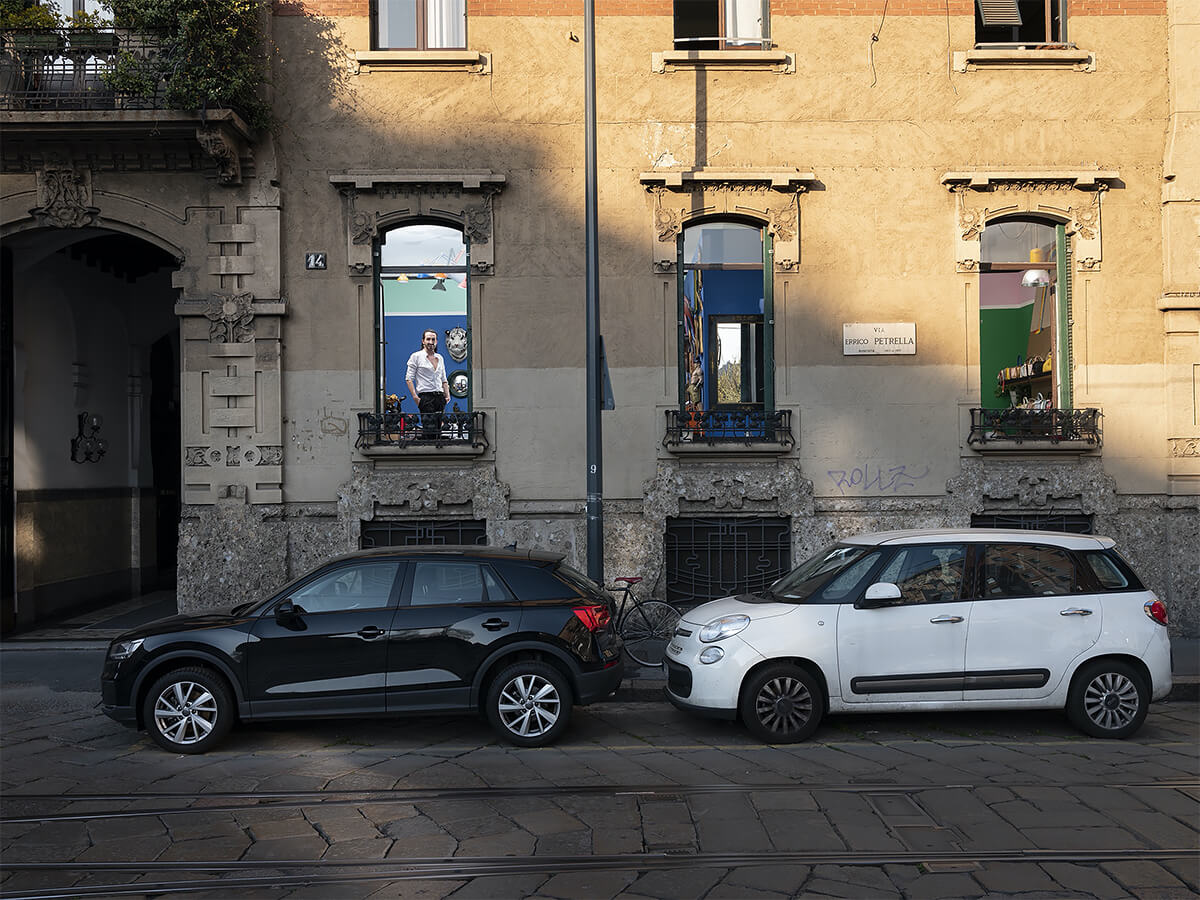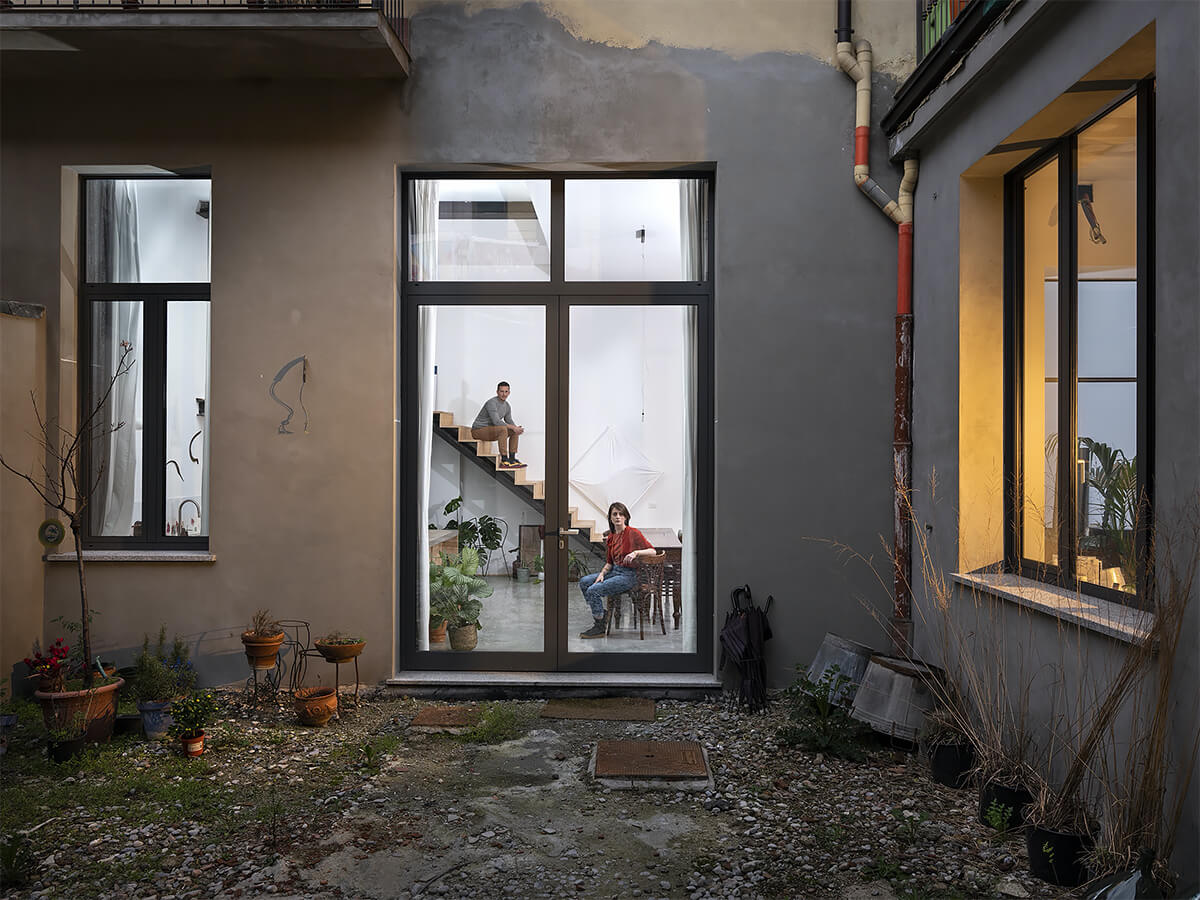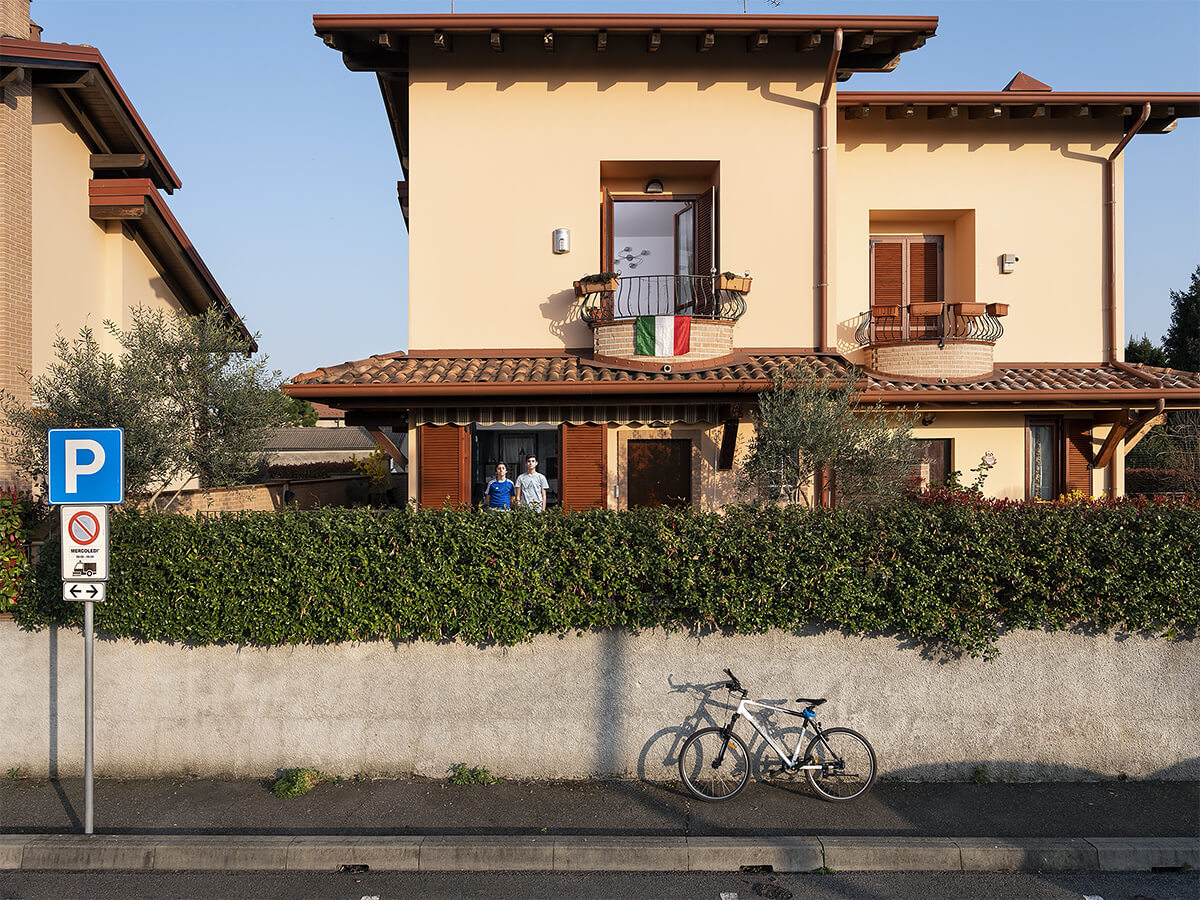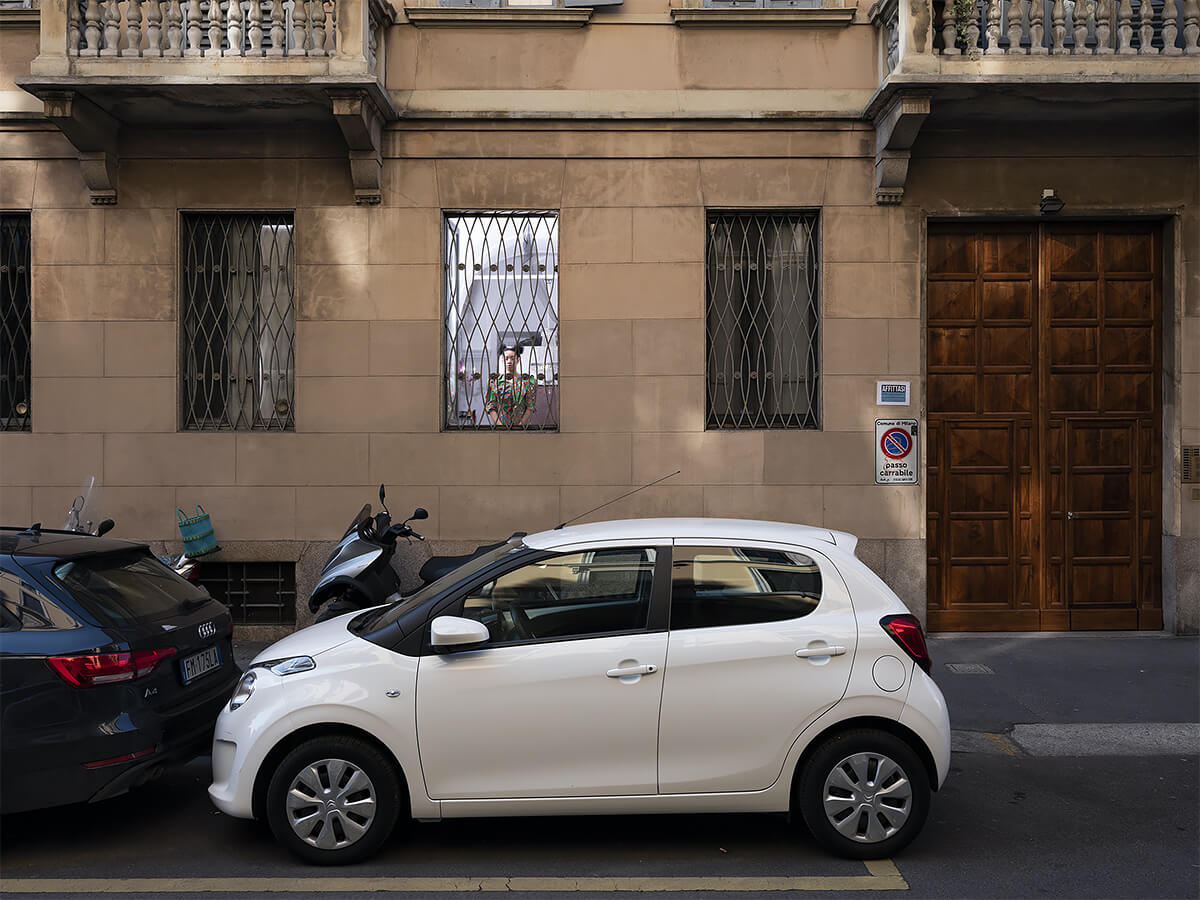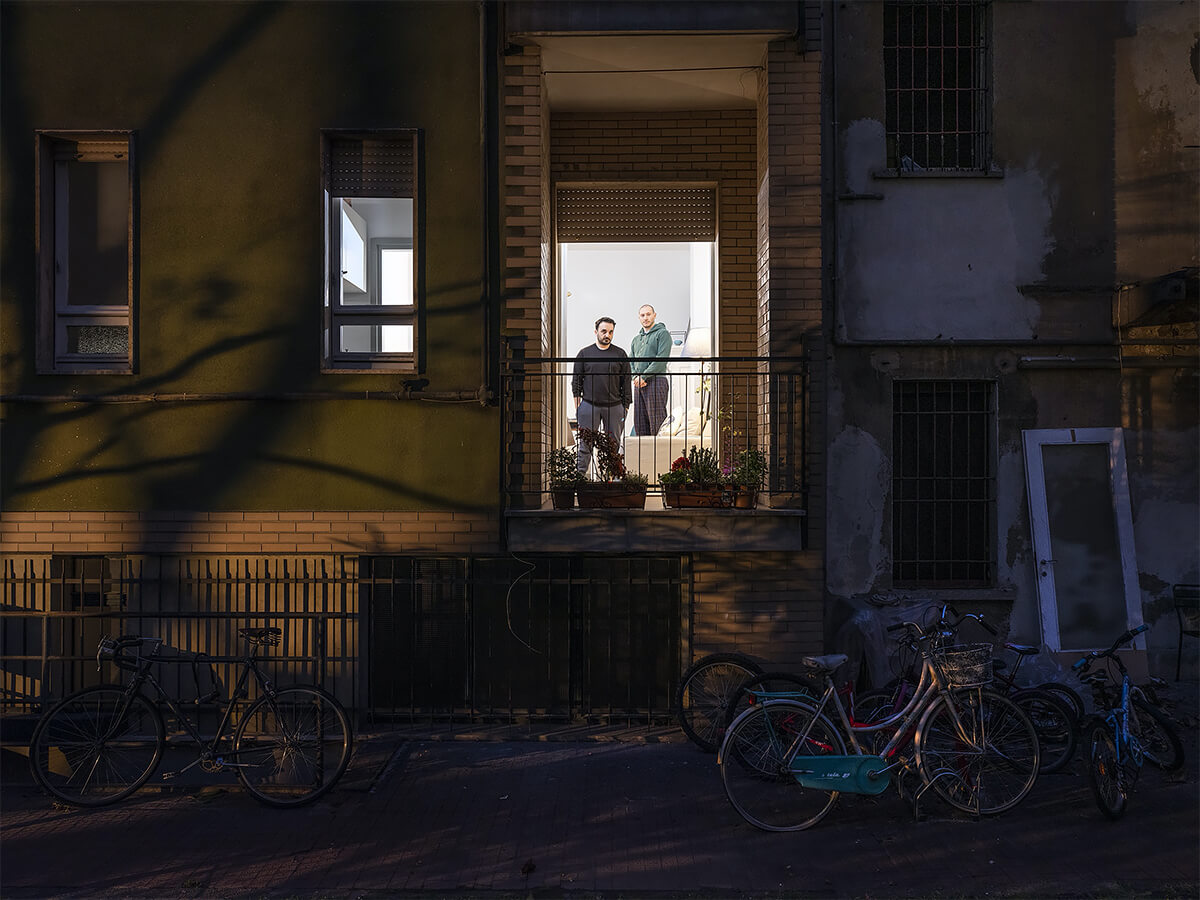In the last few weeks, since Italy has been affected by this Coronavirus emergency, I have chosen to continue working by photographing and interviewing (together with my friend Gea Scancarello) people who are locked in their homes in Milano in compliance with the quarantine imposed by the government to fight COVID-19. I left lights outside their windows, disinfecting them first. The subjects then brought them into the house and I gave them directions on how to position them by talking from outside. To take these photos, we've complied with all the necessary safety instructions.
Veronica Strazzari (36)
Before the quarantine started,Veronica says she can't remember ever spending a whole day at home. She lives in a 30-square-foot studio apartment, and since space is tight she spends a lot of time outside. Yet, since the outbreak of the epidemic and the company she works for - Prada - has closed its offices, she has rediscovered the pleasure of living her home. I'm discovering a dimension I've never experienced before, and I'm also surprised that I'm not anxious about the situation at all, she says. In addition to working at a distance, she keeps some daily rituals: I read a lot, every night I do yoga and pilates and twice a week a total body workout following an App. And then I spend a lot of time on Instagram, following new accounts: yesterday, for example, I signed up for a tour operator channel that offers travel videos. Also, she continues, since I started the quarantine I've been writing a diary of the things I learn every day.The most beautiful page is that of March 15. I had just finished a James Nachtwey book, titled Memory, which talks about photography as phenomenal isolation, as a necessary silence for understanding. I found it to be perfectly in tune with this situation.
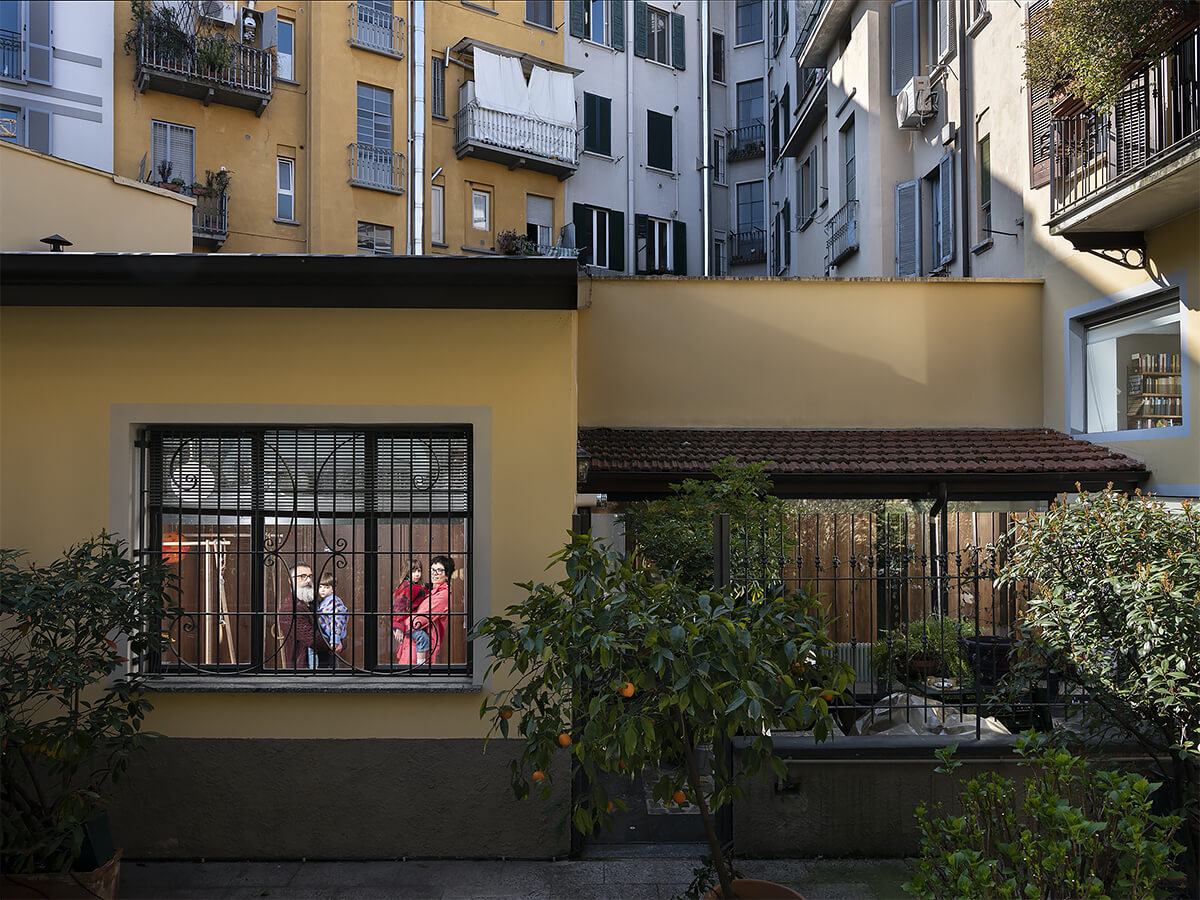
Michela and Luca's house is located in an area of Milan full of gardens and green areas, and their children are used to being outdoors a lot. Since the lockdown started, however, our only outlet is the courtyard in front of the house. And spending all your time home with the kids is hell, admits Michela.
She is a set designer, Luca works in a company of environmental recoveries. Smartworking sounds cool to say, but I challenge you to manage it having two kids always around.
She and Luca have tried to maintain a kind of normality and discipline, both for them and their children: We wake up at regular times, we get ready and do the kids' homework, every morning. The afternoon is for playing. I invent things every day: we pretend, for example, that the house is a great sea to explore, Michela adds. One of the problems that many families overwhelmed by quarantine are facing is not only how to entertain the children, but also how to get them physically discharged so that they can sleep at night: even for the little ones this is an exceptional situation.
JJ Sun (30)
JJ Sun is the spokesperson for the association of Young Chinese Entrepreneurs in Italy, an agglomeration that makes half a billion euros a year.Yet, he and the rest of the Chinese community were the first to close the shops and their activities in the famous Milanese Chinatown, putting themselves in quarantine: It's not because of racism that we Chinese closed: we could bear it. The truth is that, because we are closer to China, we knew from the very first moment that the only way to survive was to stay locked up at home. He and his family have barricaded themselves in the house, with an escort of 500 masks, necessary also for the next months. He tries to continue to run his business over the phone: he is always speaking with somebody. He has to try to keep things going, because he doesn't expect the quarantine to end quickly: I am Italian by birth, second generation Chinese: I have Italian friends, I eat Italian, I went to Italian schools. But the Italian way of doing this will kill us.
Sun is particularly worried because he believes that not all Italians have taken the lockdown seriously enough: I'm praying that everything will go well, but in my opinion it will take a long time. And I'm also worried about the reaction of the international community: either we're all aligned on the same problem and feel part of the same planet, or it's better that everyone takes care of their own interests. Otherwise we will never defeat the virus.
Paolo and Elisabeth Lombardi (44, 34)
Paolo and Elisabeth are both healthy and have never been in contact with anyone who had contracted the coronavirus. Yet the couple decided to start a quarantine many days before it became mandatory. We are two seriously hypochondriacs. At the beginning of February we flew to Prague to celebrate our anniversary, and many people were wearing masks on the plane, even though they had not yet arrived here. Then we understood that we had to start protecting ourselves, explains Paolo.
Since then, the two of them have been living out of the house the least they could: he goes for groceries and she walks her dog, only if strictly needed. Elisabeth is more frightened than her husband, she carefully watches every move of anyone who walks even a few metres away from their front door: seeing people two or three metres away already gives me a lot of anxiety.
Their house is not very big, but they manage to have two separate rooms for work. He is a statistician and he is currently writing a book, spending his days in front of the computer; she, instead, is an artisan and creates handbags: Her materials take up every available space, he smiles.
They say their greatest fear is that the situation will last for a long time, maybe until the end of 2021: I've heard it's possible, explains Elisabeth. Her only consolation is that the air is cleaner, since the traffic has stopped: We should find a way for it to stay that way.
Sadiq Marco Oladipupo - A.K.A. Roy (28)
Sadiq, who goes by Roy, is a rapper. He was born in Venice from Nigerian parents, and two years ago he moved to Milan to try to break into music. He shares a house with two flatmates and there's always people around. The lockdown, though, found him alone in the house. Luckily I'm a lonely guy: I like people but I also know how to spend time by myself, he says.
He has everything he needs to compose music in his room: I spend my days trying to be creative, to work on new songs. He thinks that trying to stimulate the imagination for new inspirations could be a good idea for everyone: I'm scared of what will happen afterwards, when the quarantine will eventually be over. A lot of people will lose their jobs and things will get even harder. But I also hope that people can use this time to try to reinvent themselves.
When he's not dedicated to music, Roy works for an NGO that takes care of the homeless. The NGO frequently sends him to Milan airport, where he first learnt about the virus. I feel a bit silly, because many times at the airport I had heard about the risk of coronavirus, but I had underestimated it, and like me many others. The consequence - he adds - is that today the government and the media must create fear among people. I don't like this somewhat oppressive climate, but I think it is necessary to convince people to behave correctly in order to overcome this moment.
Greta Tanini and Cristoforo Lippi (30 and 27)
While for most people quarantine is about boredom and obligations, Greta and Cristoforo take it as an opportunity to spend time together and explore their relationship after having been separated by an ocean for over a year. They are both students and they normally live in separate houses, with different flat-mates. But the lockdown found them together, in Greta's house, the two alone, and they have stayed there and will stay there during these weeks.
Actually we have a lot to do: I take classes online all day, Cristoforo is working on his final project. We're busy, time passes quickly, explains Greta.
The quarantine is also a test for them on moving together, a step which they have been desiring for a while.They have divided up their domestic tasks: shopping, cleaning, tidying up.
Their social interaction is limited to chatting with neighbours, at a safe distance, in the garden. They took precautionary measures very seriously so as not to spread the virus: We don't want to get sick, and we don't want our loved ones to get sick: we prefer to remain in isolation rather than taking risks or endangering the health of others.
Simeone Crispino (58)
Simeon is an artist, part of the well-known duo VedovaMazzei. He lives alone in a very large house, where at the beginning of the quarantine he has brought some of the things he needs to work in these days. For an artist, continuing to work is fundamental: that's the only way you get ideas. Yet, I must admit that most of the work is done now in front of the computer: they ask us to make performances, installations and more available on the internet. People need to occupy time and occupying it with art is a good idea,' he explains.
The rest of the time Simeone dabbles in the kitchen and plays his three guitars. About quarantine, he explains, he likes one thing above all: discipline. I have a lot of friends who are not entirely regular, who would like to break the rules and spend time together. The discipline of isolation allows me to tell them no without guilt.
Rebecca Casale (25)
Rebecca lives in one of Milan's nightlife areas, in a street crowded with bars and clubs, people staying out until late and a lot of noise coming from the sidewalks. The house she lives in is somewhat similar to that situation: four other people, apart from her, live in the place, and there is always somebody's friend staying overnight. On the evening of the lockdown, however, she was the only one in the house, and she found herself completely alone in the quarantine: I suffer a lot from loneliness: there is always a lot going on here, silence and empty spaces make everything surreal.
She is a school educator for kindergarten children and cannot do smart working. The days are very long, but I try to have some regular rituals. I spend the day deciding what I'm going to cook for dinner, always trying to do something special. Trying out new recipes keeps me feeling alive.
Her biggest fear, she explains, is losing my job: no one can say how this situation will end.
To calm down and not think about it, every night he tries to read at least an hour, to escape in a better world and keep the virus out of her dreams. The first thing I'll do as soon as I'm free is go for a coffee in a bar: the real sign of normality.
Giulio and Giacomo Marini (17)
Giulio and Giacomo are twin brothers and are used to spend most of their time together: they have always done it. Quarantine is not as hard for them as it is for most of their friends, they say: at least they still have each other's company, and they enjoy it.
Their day is marked by school classes during the morning, while the rest of the time is occupied by video calls with our friends and long workouts on the exercise bike, which replace training with our football team, says Giulio.
Nonetheless, even if killing time is not a problem the situation is starting to worry us: at the beginning maybe we didn't understand the seriousness of it all, now the numbers of those killed by the virus are becoming a nightmare, they both explain. They both stay updated with the news and their biggest fear is not knowing when all this will end: there is a lot of uncertainty. And we miss our friends very much.
Giovanna Baseggio (34) and Alessandro Treves (31)
Every day, between noon and three pm, a ray of sunshine filters through Alessandro's windows atelier. He enjoys sitting in that light, using such a rare moment of silence and peace to read and to think about the moment he is living. I believe this situation has some potential: it seemed impossible to set the world on pause, but a virus forced us to drop everything and think. Being barricaded in the house gives us the opportunity to become aware of so many things.
He is a photographer and, he says, I am not anxious at all: I think it is necessary not to be stupid but also we do not need to be paranoid. Giovanna, his partner, is more worried. They were supposed to move in together at the beginning of April, but the quarantine somehow anticipated things: We chose to come to my atelier because it is very big and there is room for both of us, Alessandro explains.
Thinking about the future is not easy: All the jobs I had at stake have been cancelled, and I don't know what will happen. But at the moment I am enjoying this sudden window of time that has been given to me.
Giancarlo Petriglia (46)
Giancarlo Petriglia lives in a large house in the centre of Milan, where he also has his workshop: on the first floor there is the company, where ten people normally work; on the upper floor his home. He produces handbags with his own brand - he's been working in the fashion industry for 24 years, he takes some pride in saying. He also owns a restaurant with a small art gallery attached: all activities have stopped since the quarantine began.
I feel lonely, of course: I'm used to being surrounded by people, and now there's no one around. All I have to do is throw myself into work, trying to design new collections for when all this will be over, he says. Apart from drawing, he spends his days on the phone: I calculate that I spend at least six hours a day calling friends and family. I talk to my parents a lot: I'm used to visiting them, but now it's like they're in New York. They are far away and have serious pathologies, and I am afraid for them.
Like many people these days, Giancarlo is also afraid of uncertainty, not knowing when things will settle down: There is a lot of time, so I think more than usual, even about the future, about what will happen next. The thing that gives him peace is, instead, music: Listening to Italian music and tidying up my house are the ways I have to calm down. I'm not afraid for myself: I know I can always get up from my knees. But many people, even those I love, might not be able to recover from this.
Daniele Veronesi and Anna Mostosi (38, 33)
The house where Daniele and Anna live was a warehouse, which they transformed into a house: it is large, spacious and beautiful, but above all in constant evolution. We are two artists and set designers, we took so much of our time and we are continuing to do small jobs these days to take up the time, explains Daniele.
In fact, at the beginning the quarantine seemed almost like a holiday, even if forced. We dedicated ourselves and our life as a couple, happily. But now, as it gets longer, the worries start. The biggest one is for Anna's parents, who live in Bergamo, one of the areas of Italy most tormented by the epidemic: They are fortunately well and we talk to them every day, we are always in contact, but the situation is not easy, she says.
Our fear is that we don't know how long the situation will last: we agree that we all have to sacrifice ourselves, but not having the slightest foothold, or a perspective that is still clear, is frightening. We greatly lack physical contact with other people.
Nicholas (12), Micheal (15) Vanola
Quarantine changes a lot depending on your age. Nicholas and Micheal are brothers, respectively 12 and 15, and they are now forced to spend all day at home, together. They do not feel the boredom, because they attend school in the morning, via computer, and once they are done with their homework they can do a lot of things together, like playing video games or board games. For once, mum can't complain.
Nicholas, who recently started to study to become a magician, is even enthusiastic: Until a few days ago mum and dad were always working: now the four of us can be together all the time, he says gratefully. His 15-year-old brother doesn't entirely agree: Sometimes it's nice, yes. But I miss the idea of being able to walk around. Being forced to stay at home is not like being there by choice.
They both say they'll remember this period forever, but they're not afraid: This situation will end one day, and we will be able to tell it to our children.
Rebecca Kazadi (26)
Rebecca's quarantine isn't like everyone else's. In fact, she works in a pharmacy and from Monday to Friday she is required to be in the store. Going to work is my breath of oxygen, she says. I'm not afraid of being more exposed than others to the virus: I take my necessary precautions, we are very careful:
Although boredom is not a problem, nonetheless she feels the hardship of this situation. I grew up with my mother and I'm very close to her. I'm used to seeing her every day, even for just a few minutes. Now it's impossible and it makes me suffer. She also misses her boyfriend: He lives a few dozen kilometres from here and I don't know when I'll be able to see him again.
Her greatest fear is precisely the uncertainty about the duration of this situation: I'm scared for my personal life, but also for the country: I think it will be a hard blow for the economy.
Diego and Francesco (28, 38)
The routine of Francesco and Diego, in these days of quarantine, hasn't changed much, they say. Francesco is a designer and an event producer, Diego an illustrator: both work from home, so they are used to sharing space and time. And yet, they both live in a state of perennial anxiety: it never passes and even permeates our sleep, explains Francesco. His greatest concern is work: We are independent, and every day it is clearer that for a long time we won't have anything to do: we need to reinvent ourselves quickly. No one will help us, he adds.
Their way of curing anxiety is to take care of each other, cooking special things and carrying out projects they had previously abandoned. I've managed to quit smoking - I've been trying for years, but now there's no one around me who smokes anymore and I've found the strength to do it.
They go out very rarely, even less than permitted: To comply with the rules we also stopped running. For the first time I seem to have understood what it means to be in jail, to see the blue sky outside and not be able to go out. I miss the freedom: seeing friends, taking a walk. And not knowing when the quarantine will really end means that our return to normality is constantly postponed: you feel deprived of everything, I don't wish it on anyone.
About Gabriele Galimberti
Gabriele Galimberti, born in 1977, is an Italian photographer who frequently lives on airplanes, and occasionally in Val di Chiana (Tuscany), where he was born and raised. He has spent the last few years working on long-term documentary photography projects around the world, some of which have become books, such as Toy Stories, In Her Kitchen, My Couch Is Your Couch and The Heavens. Gabriele's job consists mainly of telling the stories, through portraits and short stories, of people around the world, recounting their peculiarities and differences, the things they are proud of and the belongings with which they surround themselves; social media, in all its forms, is a fundamental part of the research needed to get in touch, discover and produce those stories.
Gabriele committed to documentary photography after starting out as a commercial photographer, and after joining the artistic collective Riverboom, best known for its work entitled Switzerland Versus The World, successfully exhibited in festivals, magazines and art shows around the world. Gabriele is currently traveling around the globe, working on both solo and shared projects, as well as on assignments for international magazines and newspapers such as National Geographic, The Sunday Times, Stern, Geo, Le Monde, La Repubblica and Marie Claire.
His pictures have been exhibited in shows worldwide, such as the well known Festival Images in Vevey, Switzerland, Le Rencontres de la Photographie (Arles) and the renowned V&A museum in London; they have won the Fotoleggendo Festival award in Rome and the Best In Show prize at the New York Photography Festival.
Gabriele recently became a National Geographic photographer and he regularly works for the magazine.


